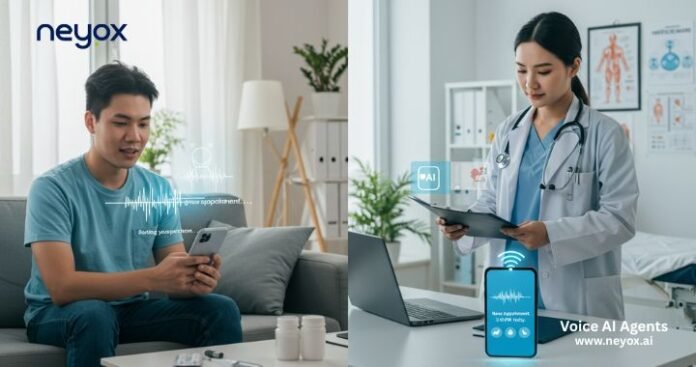The healthcare industry is rapidly evolving, driven by technological advancements that aim to enhance patient care, improve operational efficiency, and increase accessibility. One of the most transformative innovations in this domain is the emergence of Voice AI Agents for Healthcare. These intelligent systems are redefining the way patients and healthcare providers interact, creating a seamless bridge that enhances communication, delivers timely information, and supports more effective medical decision-making. As healthcare becomes increasingly digital, Voice AI is positioned to play a pivotal role in connecting patients and providers in ways that were previously unimaginable.
Enhancing Patient Communication and Engagement
Voice AI Agents for Healthcare are revolutionizing the way patients engage with medical services. Traditional methods of communication, such as phone calls or in-person visits, often come with barriers such as long wait times, scheduling conflicts, and limited accessibility for patients with mobility or cognitive challenges. Voice AI Agents provide a conversational interface that allows patients to communicate their concerns naturally, whether it is describing symptoms, asking medical questions, or requesting follow-up care.
These systems are capable of offering personalized guidance based on a patient’s medical history, medication schedules, and ongoing treatment plans. Voice AI Agents can deliver reminders for medication, prompt patients about upcoming appointments, and provide health tips tailored to individual needs. The convenience and immediacy of voice interaction foster higher engagement, encouraging patients to take an active role in managing their health. This continuous, interactive support is particularly valuable for chronic disease management, mental health monitoring, and preventive care, where consistent communication is essential.
Improving Accessibility and Reducing Barriers
A significant challenge in healthcare is ensuring equitable access to services for all patients. Many individuals face obstacles due to geographic location, mobility limitations, or socioeconomic factors. Voice AI Agents for Healthcare address these challenges by providing 24/7 access to medical guidance, eliminating the need for patients to travel to a clinic or navigate complex online systems.
By enabling patients to interact with healthcare systems through voice, these agents reduce the digital divide for those who may struggle with typing, reading, or navigating technology. Multilingual capabilities further expand accessibility, allowing patients from diverse linguistic backgrounds to communicate effectively with healthcare providers. The result is a more inclusive healthcare environment where patients can receive timely support, ask critical health questions, and access resources that would otherwise be difficult to obtain.
Streamlining Provider Workflows and Clinical Efficiency
For healthcare providers, administrative tasks and documentation often consume a substantial portion of their time, reducing the focus on direct patient care. Voice AI Agents for Healthcare alleviate these pressures by automating routine processes such as appointment scheduling, patient intake, insurance verification, and electronic health record management. This automation allows clinicians to dedicate more time to clinical decision-making, complex patient interactions, and quality care delivery.
Voice AI Agents also provide real-time access to patient information through voice commands, allowing providers to retrieve medical histories, lab results, and treatment plans efficiently. This rapid access to critical data improves diagnostic accuracy, reduces the likelihood of errors, and enhances the overall quality of care. By integrating voice AI into clinical workflows, healthcare organizations can create a more efficient, responsive, and patient-centered practice.
Supporting Remote Monitoring and Telemedicine
The rise of telemedicine has transformed healthcare delivery, making remote consultations and monitoring an essential part of modern medical care. Voice AI Agents for Healthcare play a crucial role in supporting these initiatives by interacting with wearable devices, sensors, and health tracking applications to monitor patient vitals and collect health metrics. These agents can detect irregularities, track trends over time, and notify healthcare providers of potential concerns, enabling timely interventions before conditions worsen.
This capability is particularly valuable for managing chronic diseases such as diabetes, hypertension, and cardiovascular conditions. Patients benefit from continuous monitoring and personalized guidance, while providers gain actionable insights that facilitate proactive care. Voice AI Agents enhance telemedicine by providing a conversational, interactive layer that strengthens the connection between patients and providers, even when physical consultations are not possible.
Ensuring Safety, Privacy, and Ethical Use
While the benefits of Voice AI Agents for Healthcare are significant, their implementation requires careful attention to safety, privacy, and ethical considerations. Patient data is highly sensitive, and these systems must comply with regulations such as HIPAA and GDPR to ensure secure handling of information. Robust encryption, secure authentication, and strict data governance protocols are essential to maintain patient trust and protect against breaches.
It is also crucial to recognize that Voice AI Agents are designed to complement, not replace, human judgment. While they can provide preliminary guidance, reminders, and administrative support, complex medical decisions must remain in the hands of qualified healthcare professionals. Ethical deployment involves transparency, ensuring patients understand when they are interacting with AI and the scope of its capabilities. Continuous system updates, validation, and oversight are necessary to maintain accuracy, reliability, and accountability.
The Future of Patient-Provider Connectivity
Voice AI Agents for Healthcare are bridging the gap between patients and providers by offering real-time communication, personalized guidance, and seamless access to medical information. As the technology advances, these agents are expected to incorporate predictive analytics, emotional recognition, and adaptive learning to further enhance patient care. They hold the potential to transform healthcare delivery, creating a system that is more proactive, efficient, and patient-centered.
By integrating Voice AI into clinical practice, healthcare organizations can foster stronger relationships between patients and providers, reduce barriers to care, and improve overall health outcomes. The future of healthcare is one in which intelligent, voice-powered systems work alongside human professionals to deliver timely, accessible, and empathetic care, ensuring that patients feel supported at every stage of their healthcare journey.
In conclusion, Voice AI Agents for Healthcare are redefining the patient-provider relationship, enhancing communication, streamlining workflows, and supporting remote care. Their role in bridging gaps, increasing accessibility, and improving engagement signals a new era in healthcare where technology and human expertise collaborate to deliver superior patient experiences and outcomes.



